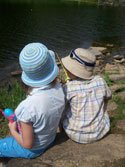Scope & Sequence
 I think that the layout of these "Idiot's Guide" (and equally the "Dummies" book) books are terribly amusing.
I think that the layout of these "Idiot's Guide" (and equally the "Dummies" book) books are terribly amusing.
The "Running Start Checklist" made me giggle. It's a bright orange page tucked just inside the front cover. In this particular book, it's a how to list. As in, you've yanked your kid out of school today and you need to know what to do tomorrow, this week and this month in order to be homeschooling.
It was reading this first checklist that made me bring this book home from the library. It started out advocating a deschooling period, a child-led approach when determining interests and activities and observation, journalling and reading for the homeschooling parent - all advice I've heard from seasoned and confident homeschoolers I've had the opportunity to cross paths with.
The first part of the book covered background and basics of homeschooling. To my surprise, the author included what I'm assuming is the Canadian content she could find. Nice. These three chapters I would give to the sceptical, yet curious, grandparent. Also covered are the 'Beginner Questions' like What about Socialization? What about College? Can you afford to Homeschool? etc. So after reading about homeschooling through the last century, the legalities in North America, reasons for homeschooling, numbers of homeschoolers, and famous homeschoolers, I was feeling reaffirmed in our homeschooling journey. So I read on.
The author gave an explanatory overview of philosophies and approaches. She covered umbrella schools and other required hoops that many homeschoolers have to jump through. She went on to explain support groups. I like how she not only defines all of these things, but she also gives suggestions and ideas for the seasoned homeschooler. Like if, for example, I was looking to expand on the support group in my area. She gives helpful suggestion about things to consider that I would never have thought of until it was too late.
Then we got to the nitty-gritty of planning. The reader is led through an in-depth process of choosing a complete boxed curriculum. I found this process valuable as I could simplify it quite easily to a process of choosing a resource of any sort. After all, not all of us want a complete curriculum. But I imagine that all of us, at some point, are going to be wading through
book lists or catalogues looking for a special something that is going to click with one of our kidlets. With choosing a curriculum over with, I read on to find suggestions on planning your own curriculum. Again I was presented with starting points and principles - not a 'Do This...' but a 'Try Starting Here and See What You Come Up With For Your Kids..." approach.
As I read on, I was happy to see how easy the author made it sound. She repeated over and over that a strong academic focus was not necessary to be successful in homeschooling. She stuck to principles of child-led learning, alternatives to schoolish work and how to interpret your child's accomplishments into educationese. Ages 3 - 5 through teenagers as well as special needs kids were covered. Sections on assessments, other ways of measuring progress, record keeping, fostering self-directed learning, dealing with doubts and avoiding burnout and using the internet finished off the book.
It was an easy read, as these books are usually. I think that's the point. I've come away from the book with a better understanding of homeschoolers in general, in particular, those who don't have it so free and easy as we in Ontario do. As I said, some of the ideas in the book really helped to reaffirm for me the how's and why's of my views of homeschooling. The particular information I was looking for I had to go back and read a couple of times. I think I wanted it to be more complicated than it is. I have a good starting block, I feel.
And just where am I starting, you ask? I'd like to try my hand at planning our school year a little more concretely than we have in the past. So I am poking through some scope and sequence information on the 'net. I have found one I like, not for the content, per se, but the format appeals to me. I know that I will be picking and choosing and rearranging. I may even take the format and plug in our own content. An integral part of the finished product will be those areas that the kids want to learn about - whatever they may be.
In my search for various Scope & Sequence things, I came across Little Acorns Treehouse. A school-at-home family, I admire the organization that has gone into many aspects of Jenny's homeschooling life. I'm sure if I attempted that level of organization in our humble life, the fabric of the known universe would tear and all chaos would break loose as I tried to keep up with myself. That, and Brian would keel over with heart failure. And since I like having him around in my known universe, you can be sure I won't be upsetting the status quo too much. ;-)


1 comment:
Thanks for reviewing this. I just can't add anything else to my reading list this summer, no matter how easy a read it is.
I find it funny that some call me organized. I just make a simple list and check off. I've seen homeschool organization and I know I'm not.
I don't follow any rule, I just make guidelines.
Peace and Laughter,
Post a Comment